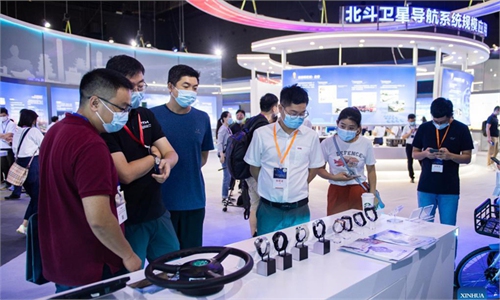
A smartphone with Ride-hailing apps Didi Chuxing, Dida Chuxing and Cao Cao Mobility Photo: VCG
China's Ministry of Transport on Monday released a work plan, demanding major ride-hailing platforms to lower the ceiling on excessive commission fees by end-May, in a latest move to protect new platform-economy workers' rights and prop up the industry's healthy development.
Major online ride-hailing and road freight transportation platforms are asked to cut their excessive commission fees or cap their membership fees by end-May, according to a notice issued on the website of the ministry on Monday.
The ministry will strive to standardize platform companies in the transport business, in order to create a favorable employment environment and promote the sound, sustainable and high-quality development of the industry, the notice said.
The move was welcomed by ride-hailing drivers. A driver told the Global Times on Monday that the platform takes too much in commission fees, which sometimes exceed 30 percent of the total order, and many drivers are now reluctant to take orders through ride-hailing platforms.
By end-May, major ride-hailing platforms should complete the work to lower the caps for excessive commission fees or membership fees.
By end-July, regional transportation authorities should conduct regular inspections to ensure the companies complete their goals.
The new policies will prevent the unhealthy development of ride-hailing platforms. Cutting commission fees will directly increase workers' incomes and boost household consumption, thus promoting an economic recovery, experts said.
In 2022, China's sharing economy continued to expand and play a positive role in enhancing the resilience of economic development and stabilizing employment, according to a report issued by the State Information Center, a government think tank.
According to the report, online delivery revenue accounted for about 25.4 percent of the national catering industry's revenue in 2022, up 4 percentage points from the previous year.
The number of online ride-hailing passengers accounted for about 40.5 percent of the total number of taxi passengers, 6.4 percentage points higher than in 2021.
Experts said that the move will not have a great impact on platform companies, but will expand the users' pool of the platforms.
They said that similar policies may be applied to the food delivery and express industries to increase the sense of gain for workers.



